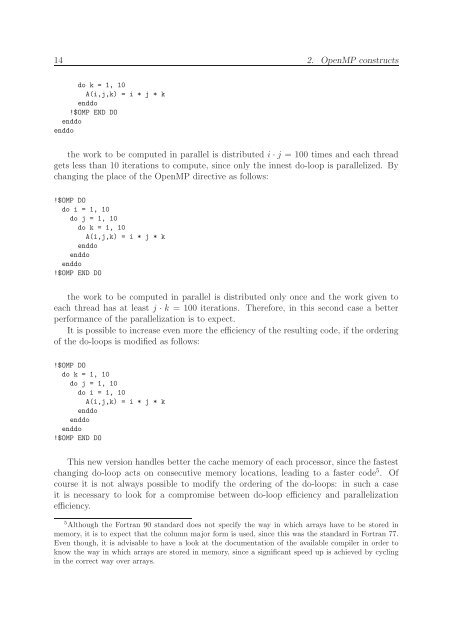Parallel Programming in Fortran 95 using OpenMP - People
Parallel Programming in Fortran 95 using OpenMP - People
Parallel Programming in Fortran 95 using OpenMP - People
You also want an ePaper? Increase the reach of your titles
YUMPU automatically turns print PDFs into web optimized ePapers that Google loves.
14 2. <strong>OpenMP</strong> constructs<br />
do k = 1, 10<br />
A(i,j,k) = i * j * k<br />
enddo<br />
!$OMP END DO<br />
enddo<br />
enddo<br />
the work to be computed <strong>in</strong> parallel is distributed i · j = 100 times and each thread<br />
gets less than 10 iterations to compute, s<strong>in</strong>ce only the <strong>in</strong>nest do-loop is parallelized. By<br />
chang<strong>in</strong>g the place of the <strong>OpenMP</strong> directive as follows:<br />
!$OMP DO<br />
do i = 1, 10<br />
do j = 1, 10<br />
do k = 1, 10<br />
A(i,j,k) = i * j * k<br />
enddo<br />
enddo<br />
enddo<br />
!$OMP END DO<br />
the work to be computed <strong>in</strong> parallel is distributed only once and the work given to<br />
each thread has at least j · k = 100 iterations. Therefore, <strong>in</strong> this second case a better<br />
performance of the parallelization is to expect.<br />
It is possible to <strong>in</strong>crease even more the efficiency of the result<strong>in</strong>g code, if the order<strong>in</strong>g<br />
of the do-loops is modified as follows:<br />
!$OMP DO<br />
do k = 1, 10<br />
do j = 1, 10<br />
do i = 1, 10<br />
A(i,j,k) = i * j * k<br />
enddo<br />
enddo<br />
enddo<br />
!$OMP END DO<br />
This new version handles better the cache memory of each processor, s<strong>in</strong>ce the fastest<br />
chang<strong>in</strong>g do-loop acts on consecutive memory locations, lead<strong>in</strong>g to a faster code 5 . Of<br />
course it is not always possible to modify the order<strong>in</strong>g of the do-loops: <strong>in</strong> such a case<br />
it is necessary to look for a compromise between do-loop efficiency and parallelization<br />
efficiency.<br />
5 Although the <strong>Fortran</strong> 90 standard does not specify the way <strong>in</strong> which arrays have to be stored <strong>in</strong><br />
memory, it is to expect that the column major form is used, s<strong>in</strong>ce this was the standard <strong>in</strong> <strong>Fortran</strong> 77.<br />
Even though, it is advisable to have a look at the documentation of the available compiler <strong>in</strong> order to<br />
know the way <strong>in</strong> which arrays are stored <strong>in</strong> memory, s<strong>in</strong>ce a significant speed up is achieved by cycl<strong>in</strong>g<br />
<strong>in</strong> the correct way over arrays.
















